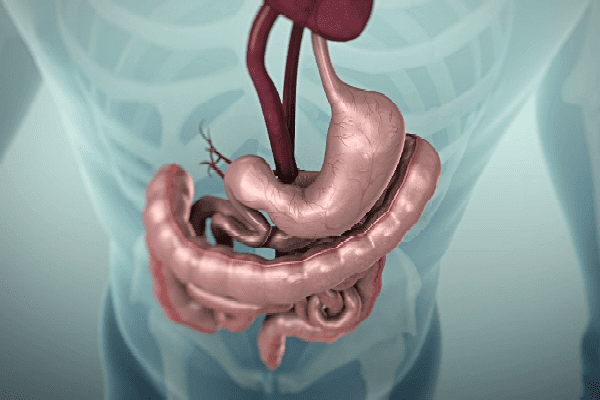Digestive regulators >>>> Motilin is a digestive hormone
Motilin is a digestive hormone.

Motilin is a prokinetic protein that belongs to the group of gastrointestinal hormones - digestion regulators. Motilin is one of the most important hormones that is responsible for the movement of food through the gastrointestinal tract, i.e. it controls the tone of the lower esophageal sphincter (pylorus), regulates the peristalsis of the smooth muscle muscles of the stomach and, to a greater extent, the small intestine, and also enhances the motility of the large intestine.
The secretion of the hormone occurs not in the glands of the endocrine system, but in the peripheral cells (Mo cells) located in the mucous membrane of the antrum of the stomach (lower stomach), duodenum, jejunum, sigmoid colon.
The hormone motilin is a cyclic neurotransmitter (a migratory neurotransmitter) that performs its functions not at the moments of meals, but in the periods between them. So the mechanical pressure of the volume of food on the walls of the stomach and intestines reduces the production of motilin. The hormone motilin is secreted at intervals of one and a half to two hours, which ensures the methodical movement of processed food along the digestive tract, ensures the migration of gastric enzymes, mucus and saprophytic microorganisms along the digestive tract.
The secretion of motilin into the bloodstream occurs in a cascade, that is, its presence in the blood again provokes secretion, which leads to an increase in the concentration of motilin. Somatostatin controls the secretion of motilin, an increase in the concentration of bile in the duodenum increases the secretion of motilin, and the increased acidity of the duodenum, high levels of adrenaline in the blood reduce its secretion.
The discovery of the hormone motilin in 1967 in the course of studies of the influence of the acidity level in the duodenum on the motor activity of the intestines in animals made amendments to the pathogenetic features of the motor functions of all parts of the gastrointestinal tract.
In most functional intestinal disorders, there is a connection with disturbances (increase or decrease) in the secretion of motilin. Certain hormones can block the secretion of motilin, which causes intestinal dysfunction (sex hormones, adrenaline).
So the hormone is responsible for the development of intestinal atony, the appearance of colic, flatulence, diarrhea, constipation, and abdominal pain. Responsible for the production of pepsinogen in the stomach, somatostatin, pancreatic polypeptide, insulin.
Motilin has other features as well. It affects the proliferation (proliferation) of pre-adipocytes - the precursors of fat cells; impaired secretion of motilin explains the development of biliary dyskinesia.
Currently, a parallel is drawn between the similar effect on the contractile function of the smooth muscles of the gastrointestinal tract of antibiotics of the macrolide group (in particular, erythromycin), which makes it possible for the latter to participate in the treatment of functional disorders of the gastrointestinal tract. Research is in the development stages.

Read

Read



























